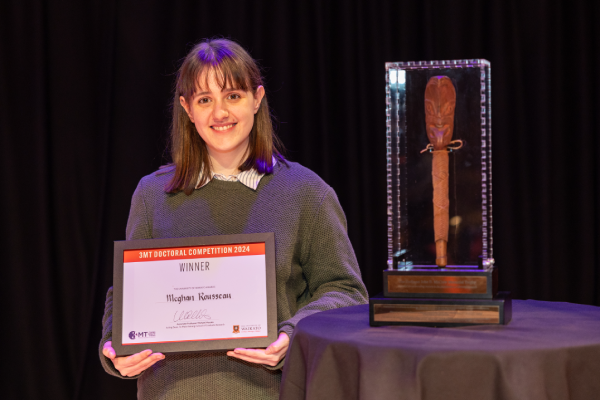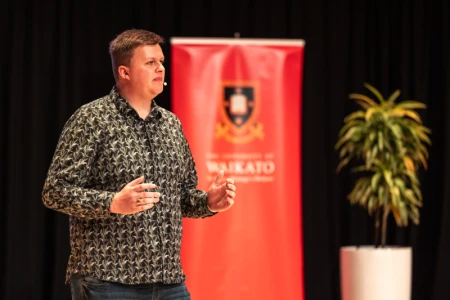In just three minutes, PhD student Meghan Rousseau condensed extensive research and countless hours of experiments into a compelling presentation on tuberculosis, earning her the top prize at the University of Waikato’s Three Minute Thesis (3MT) competition.

The annual event, which challenges doctoral students to distill an 80,000-word thesis into a three-minute talk, is designed to make complex research accessible to a non-specialist audience.
Meghan’s winning research, Fighting the Resistance: Investigating TB’s Molecular Shield Against Antibiotics, explores the world’s deadliest infectious disease and its resistance to current treatments.
“Our frontline defence against TB has long relied on a powerful arsenal of antibiotics, with current treatments combining at least four strong antibiotics and treatment of up to nine months,” says Meghan.
To treat these resistant strains, we need to develop new drugs, but first, we need to understand how TB remains resistant to even our most advanced treatments.
Her research focuses on a protein called Lsr2, crucial to TB’s ability to withstand immune attacks. By visualising and measuring Lsr2 within cells, Meghan aims to uncover its structure and function, which could lead to the development of drugs capable of inactivating this protein and potentially stopping TB in its tracks.
Meghan, who holds a Master of Science (Research) and a Bachelor of Science from the University of Waikato, is pursuing a PhD in Molecular and Cellular Biology within Te Aka Mātuatua School of Science. She will represent the University of Waikato at the 2024 Virtual Asia-Pacific 3MT Competition.

The competition’s runner up, Zane Sheeran, a PhD student from Te Kura Whatu Oho Mauri School of Psychology, spoke about the link between green businesses and employee outcomes.
His research highlights the significant connection between a company’s sustainability practices and employee wellbeing and performance.
“Low levels of wellbeing in the workplace result in employees taking time off without a valid reason, having low levels of performance and productivity and ultimately handing in their notice and looking at work elsewhere,” says Zane.
This comes at a huge cost to the global economy, estimated to be around 1.6 trillion dollars every year, he says.
We’re currently using 1.7 times the Earth’s natural resources each year, and it’s only getting worse.
Zane is currently working with businesses to investigate if a causal link exists between sustainability and employee outcomes using an intervention-based approach.
University of Waikato Deputy Vice-Chancellor Research, Professor Gary Wilson, says it’s a privilege to witness the groundbreaking research taking place at Waikato.
“PhD candidates are at the core of our research ecosystem. Throughout their journey, they develop critical thinking, refine their research methodologies, and acquire a range of skills that extend beyond their projects, all of which contribute significantly to the University’s research mission,” says Professor Wilson.
Events like this one not only highlight their cutting-edge ideas but also work to increase public access to and engagement with our PhD candidates' innovative work.
A Highly Commended award was given to Bonnie Maihi (Tainui), a PhD student from Te Pua Wānanga ki te Ao Māori and Indigenous Studies, for her research on youth growing up within gang space in Aotearoa.
The 3MT competition, originally developed by The University of Queensland in 2008, is now held in over 900 universities across more than 85 countries. This year’s event was judged by Professor Tangiwai Rewi, Dean of Te Pua Wananga ki te Ao, Faculty of Māori and Indigenous Studies, Dr John Sharpe, Executive Vice President of Flow Cytometry and Shelley Campbell, CEO of WISE Group.



